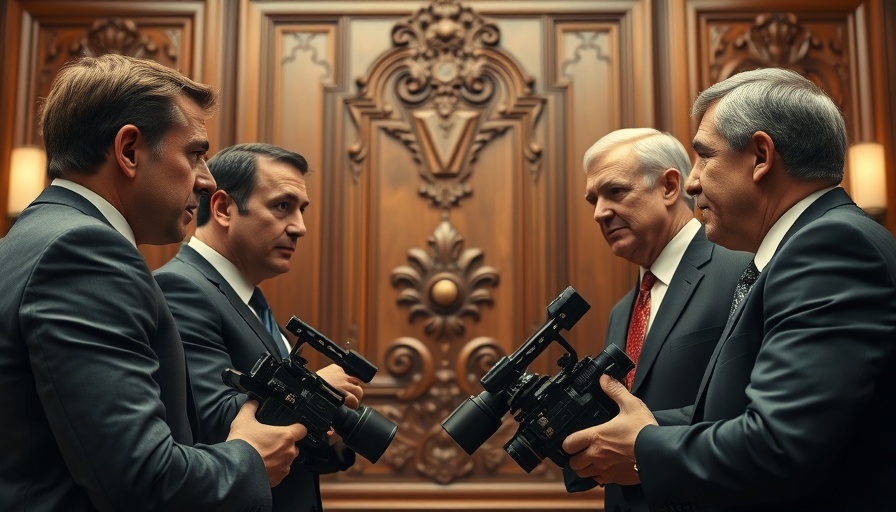
Chaos in Mexico's Senate: A Closer Look
In a startling turn of events, Mexico’s Senate was engulfed in a physical altercation following a contentious debate over drug cartels and the involvement of foreign military forces. This incident, which unfolded on August 28, 2025, is not just a reflection of rising tensions within the political sphere but also underscores the ongoing struggle with drug-related violence in the nation.
The Details Behind the Brawl
The conflict erupted between Alejandro Moreno, leader of the opposition Institutional Revolutionary Party (PRI), and Gerardo Fernandez Noroña of the ruling Morena party. It began when Moreno confronted Fernandez Noroña after seeking permission to speak during a legislative session. Their disagreement swiftly devolved into a physical fight as Moreno allegedly accused Fernandez Noroña of stifling debate on critical issues concerning national security and foreign intervention.
Reports indicate Moreno physically grabbed Fernandez Noroña, leading to shoving and punches being thrown, culminating in a scene of chaos where a photographer was knocked over, and additional lawmakers got involved. The incident highlights the emotional stakes behind these discussions as legislators grapple with the alarming rise of drug violence fueled by powerful cartels.
Historical Context: Mexico’s Drug War
The roots of these tensions lie deep within Mexico’s fraught history with drug trafficking. Since the Mexican government began its war on drugs in 2006, over 300,000 lives have been claimed, with deteriorating security affecting everyday citizens and political stability alike. Different administrations have grappled with how to adequately address this crisis, often leading to polarized positions within legislative bodies.
The recent brawl can be perceived as a culmination of frustration from opposition parties who feel that the government's strategies are inadequate against the pervasive violence wrought by cartels. As debates become increasingly heated, political factions become more polarized, mirroring the societal division caused by drug-related crime.
Public Reaction and Implications
The public's reaction to the brawl has been one of shock and outrage, coupled with a sense of resignation regarding political proceedings in Mexico. Many citizens are left wondering how lawmakers can effectively address the critical issue of drug violence when they can’t maintain decorum during debate.
This spectacle might incite calls for reform from voters demanding more accountability and a clearer strategy from their leaders. The ability of elected officials to resolve conflicts, both in terms of legislative disputes and broader national security challenges, is now under scrutiny.
The Role of Foreign Military Intervention
At the center of the debate was the controversial proposal for U.S. military intervention against drug cartels. Some lawmakers argue that foreign assistance is a necessary measure as Mexican forces continue to struggle against well-armed, organized crime groups. Conversely, others fear that inviting external armed forces onto Mexican soil could result in a violation of sovereignty and further complicate the conflict.
This debate mirrors broader discussions in U.S.-Mexico relations, particularly given the historical context of foreign involvement in Latin American conflicts. With increasing desperation stemming from violence, foreign military help becomes an appealing solution for some, yet it raises significant ethical and political questions regarding sovereignty and effectiveness.
Future Predictions: Is Change on the Horizon?
As citizens reassess the capabilities of their leaders, a potential shift in political dynamics may occur. The chaos witnessed in the Senate could translate into increased voter engagement, with voters pushing for candidates who handle legislative processes with poise and integrity. Furthermore, the ongoing discourse surrounding drug cartels may drive comprehensive policy discussions aimed at tackling the root causes of drug trafficking and violence.
Political analyst suggest that the ramifications could also result in innovative coalitions formed among parties dedicated to reforming security laws and drug policy, prioritizing public safety over partisanship.
Conclusion
The recent brawl in Mexico’s Senate not only reflects the escalating tension within political corridors but also signifies a critical moment in the ongoing struggle against drug cartels. As public sentiment evolves, Mexico's political landscape may face dramatic changes prompting leaders towards more unified actions and strategies. With upcoming elections and pivotal discussions surrounding drug policy, the need for effective governance has never been more imperative.
 Add Row
Add Row  Add
Add 




Write A Comment